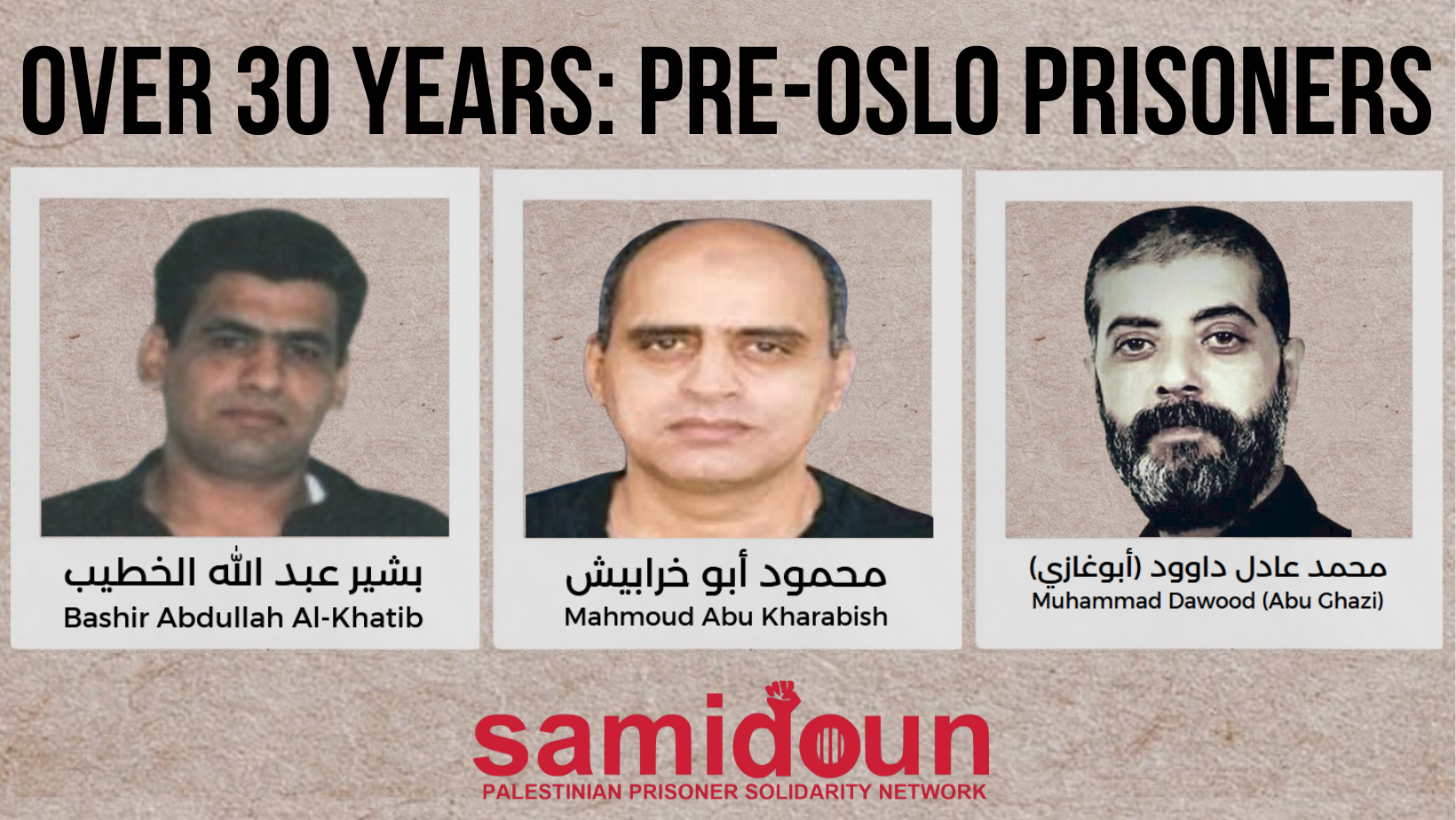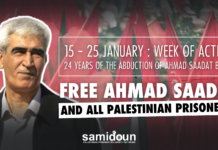
Samidoun Palestinian Prisoner Solidarity Network is providing the materials for the third week of the educational campaign, Over 30 Years: Pre-Oslo Prisoners.
Read the previous two sets of materials:
- Week 2: Ibrahim Bayadseh, Ahmad Abu Jaber, Samir Abu Nima
- Week 1: Mohammed Al-Tus, Ibrahim Abu Mokh, Walid Daqqa
This week, we will highlight the Palestinian prisoners: Mohammed Adel Daoud, Mahmoud Abu Kharabish and Bashir Abdullah al-Khatib. You can print the posters below, hang them in your cities and communities, and share this link to highlight the struggle of long-held Palestinian prisoners for justice and liberation.
This campaign highlights the “deans of the prisoners,” a term used by Palestinians to describe those who have been held in Israeli occupation jails for over 20 years continuously. Over the years, many Palestinian prisoners were liberated through prisoner exchange deals or other forms of political concession, such as those released in 1995 after the Oslo Accords; the prisoner exchange deal imposed by Hezbollah in 2004 with which 400 Palestinian prisoners were freed; the Wafa al-Ahrar prisoner exchange in 2011, where 1027 Palestinian prisoners were liberated in exchange for the release of the Israeli soldier Gilad Shalit captured by the resistance; or in 2013 when the occupation announced the release of 104 Palestinian prisoners coinciding with the return of the Palestinian Authority to negotiations and the continuation of its security coordination with the occupier under the terms of Oslo and its corollaries.
This campaign aims to ensure that these veteran Palestinian prisoners are not only not forgotten but highlighted and central to the prisoners’ struggle and the Palestinian liberation movement as a whole. Contact us at samidoun@samidoun.net to let us know about actions and events in your area.
 Mohammad Adel Daoud (Abu Ghazi)
Mohammad Adel Daoud (Abu Ghazi)
Muhammad Adel Hassan Daoud (Abu Ghazi) has been detained by the occupation since his arrest on 18 December 1987. A dedicated resistance struggler born in 1962, he was sentenced to life in prison for targeting the cars of illegal settlers on the Qalqilya bypass road, including the head of the Qalqilya area settlement council and for his role in the Fateh armed resistance. His family was subjected to collective punishment after his arrest and imprisonment, as the occupation confiscated their family home.
Despite multiple prisoner exchanges and a supposed agreement to release prisoners accopanying the Oslo Accords, the occupation has refused to release him. He was denied family viits altogether for many years and continues to be allowed family visits only once a year. During his time behind bars, he lost both his father and mother and was prohibited from attending their funerals. In fact, his father suffered a fatal heart attack the night before he was to visit Mohammed. He had gathered family photos to take to Mohammed in prison and died with the photos still in his pocket, not having seen his beloved son.
In 2021, the occupation prison administration transferred Mohammed Daoud from Gilboa prison to Afula hospital by ambulance after his health deteriorated, only after pressure and demands from his fellow prisoners about the deterioration of his health. He has suffered from continuous illness due to long and harsh conditions of detention in addition to the systematic policy of medical negligence that affects all sick prisoners. During his time behind occupation bars, he has lost most of his teeth and relies on eating soups and liquids. He has suffered from severe abdominal pain for some time and later developed chronic stomach problems that required surgery. He also suffers from psoriasis, a skin condition that caused cracks and bleeding, and he requires additional surgery to address his ongoing medical issues.
Mohammed’s family considers that the prison, its windows, stones, and prisoners have been replaced, and generations of the family have come into the world, and generations have gone, and generations have married and given birth, and their son, Mohammed, remains behind bars.

Mahmoud Abu Kharabish
Palestinian prisoner Mahmoud Abu Kharabish was born in the city of Jericho, Palestine, in early June 1965. He was a farmer, affiliated with the Fateh movement, and is the longest-held Palestinian prisoner from the Jericho area. He was seized by occupation forces at the age of 23 on 31 October 1988 for throwing Molotov cocktails at a settler bus in Jericho during the great popular Intifada. He was seized by the Zionist authorities and sentenced to life imprisonment. Currently detained in the occupation’s Ramon prison, he has been held behind bars for nearly 35 years.
During his detention, he has been repeatedly isolated in solitary confinement cells, leading him to conduct several hunger strikes against these abuses. Despite all of the harassment intended to isolate the prisoners from the outside world, Mahmoud Abu Kharabish did not give up and focused on educating himself during these years. He finished his high school studies inside the occupation prisons and completed his undergraduate studies at Al-Quds University by correspondence, despite the occupation’s attempts to bar Palestinian prisoners from continuing their education. He also managed to learn several languages behind bars, including English, Hebrew, Spanish and German.
During his time behind bars, Abu Kharabish has been transferred to several prisons, including Junaid, Ramle, Beersheba, Hadarim and Ashkelon prison, during which he has been subject to torture, mistreatment and poor conditions, all of which are committed against prisoners with the aim of forcing them to back down from their positions and coerce them away from participating politically in the Palestinian cause. Despite all of this, he is known for his cheerful personality and his laughter among his fellow Palestinian prisoners.
When he was seized by occupation forces, he was married and his daughter, Asma, was born only 40 days before his arrest. His family home was demolished the same year in an act of collective punishment against his family. While Mahmoud has remained behind bars, Asma finished her university studies, got married and had children. She is still waiting for the day that the sun of freedom will shine upon hr father, who she has been deprived of by the prisons and jailers for nearly 35 years.
In an interview, Asma said: “No matter how old I become, I still have that child inside me who was deprived of her father, who was forbiddent to share his life with his family…The occupation did not only deprive me of my father, but also of having a larger family. My father was seized when I was an infant no more than 40 days old. How I wished to have sisters and brothers to share in the love of our beautiful family…I am proud of my father. He is my hero, from whom I derive greater steadfastness, especially as he continues his steadfastness against the occupation authorities and their crimes. He has the right to freedom no matter how long he has spent behind occupation bars. As long as his will remains, his freedom is certain.”
Mahmoud Abu Kharabish was not only deprived of the embrace of his daughter Asma, but also of his connection to the palm trees of Jericho. For him, agriculture was much more than just a profession to mke his livelihood. He had a stor for every palm tree and every date he tasted. His name was among those of the veteran prisoners who were supposed to be released after the signing of the Oslo accords in 1993, but the occupation authorities violated their promises to release the remaining prisoners, and Mahmoud and his brothers remain imprisoned until the present day.
Asma recalled that “They killed our joy and happiness after we prepared to celebrate, and my grandmother ululated outside our home waiting to receive him. We had prepared our home to receive well-wishers and distribute sweets.”
During the long years behind bars, he has suffered from multiple diseases, which have worsened due to systematic medical neglect and denial of medical treatment. He suffers from heart disease and joint problems with the bones of his foot, which has led to great pain that makes it difficult for him to walk. The transfers to multiple prisons and to solitary confinement cells have further injured his health, with Abu Kharabish taking up hunger strikes to achieve his just demands.
His father passed away in 1993 while he remained behind bars, denied attendance at his funeral. He is repeatedly denied family visits due to “security” excuses. His mother, who is ill and has only one kidney, visited him only once after seven years of interruption. She was brought to the prison in an ambulance for the family visit.

Bashir Abdullah al-Khatib
Palestinian prisoner Bashir Abdullah al-Khatib, 62 years old, from Ramla in occupied Palestine ’48, has been jailed for 34 years in the occupation prisons.
He was seized on 1 January 1988, amid the rise of the great popular intifada throughout occupied Palestine, and charged with membership in a prohibited organization, possession of weapons and explosives, and participating in the armed Palestinian resistance. He was sentenced to life imprisonment; in 2012, the term of his sentence was set to 35 years. Like other Palestinian prisoners from occupied Palestine ’48, he is targeted by the new Zionist law that aims to render Palestinian prisoners stateless after their release.
He has been moved repeatedly between multiple prisons and subjected to various types of violations by the occupation prison administration. Like his fellow prisoners of occupied Palestine ’48, the occupation refused to include him in the prisoner exchanges, such as the Wafaa al-Ahrar exchange, claiming that his imprisonment is an “internal Israeli” matter.
During the long years of his captivity, Bashir lost all his teeth and could only eat with great difficulty.
When Al-Khatib was arrested, his five children were in their early years. They have grown up and married while he remains behind bars. He was only able to receive visits from his grandchildren after a lengthy legal battle; they had been denied on the pretext that they are not “relatives of the first degree.”
Poster of the prisoner Muhammad Adel Daoud (Abu Ghazi)
Poster of the prisoner Mahmoud Abu Kharabish
Poster of the prisoner Bashir Abdullah Al-Khatib
Discover more from Samidoun: Palestinian Prisoner Solidarity Network
Subscribe to get the latest posts sent to your email.




